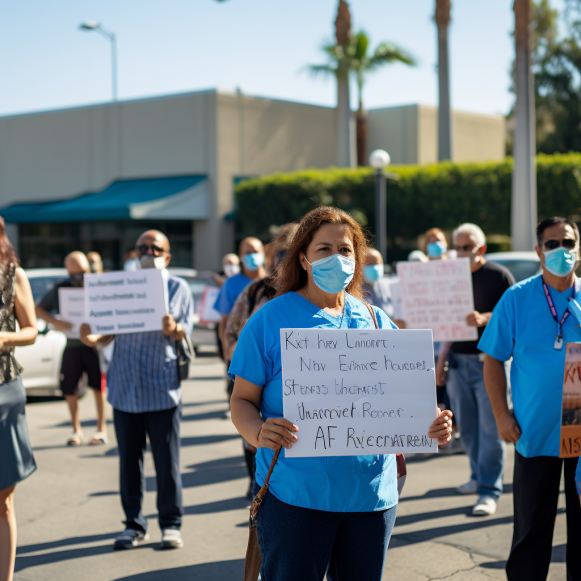Kaiser workers set for massive strike with picketers around the Bay Area: What to know

Talks continue, but wages are a sticking point
Kaiser Permanente is warning patients about potential disruptions in medical care ahead of a massive three-day strike scheduled to begin Wednesday morning if a new contract agreement with its workforce cannot be reached.
Picket lines are planned for 6 a.m. outside more than a dozen Bay Area medical centers, including Kaiser’s major facilities in San Jose and Oakland, in an effort to secure higher wages and more job protections. Some 23,000 Kaiser employees in the Bay Area are preparing to go on strike.
The strike by 75,000 Kaiser employees across the country comes amid a surge in strikes in the United States. A months-long strike by Hollywood writers ended late last month thanks to an agreement reached between their union and film and television producers. Actors in film and television are still on strike against Hollywood studios. Thousands of unionized auto workers went on strike in mid-September over wages at General Motors, Ford, and Chrysler-owned Stellantis. Since early July, hotel workers in Southern California have been on strike on and off. Meanwhile, California Gov. Gavin Newsom vetoed a bill on Saturday that would have provided unemployment benefits to striking workers.
Both Kaiser and a coalition of unions representing workers — including lab and X-ray technicians as well as some nurses — cited progress in negotiations over the weekend, but not enough to call off the planned walkout. According to Kaiser, both parties agreed on Monday morning to continue meeting until midday Tuesday if necessary.
In California, the health-care behemoth serves 9.4 million patients. Here is what Kaiser members should know:
Q: If there is a strike, will all Kaiser facilities close?
A: Kaiser stated that all hospitals and emergency rooms would remain open. “Our facilities will continue to be staffed by our physicians, trained and experienced managers, and staff,” Kaiser said on Monday, adding that it might hire “professionals contracted to serve in critical care roles specifically for the duration of a strike.”
Q: I have Kaiser insurance. Could I still get health care if there was a strike?
A: According to an online advisory, Kaiser has plans in place to ensure that patients “continue to receive safe, high-quality care.”
Q: What would happen to patients if Kaiser employees went on strike?
A: According to a message sent to patients on Monday, if workers go on strike, Kaiser may have to reschedule “some non-urgent appointments and procedures.”
Q: How will I know if I need to reschedule my appointment or procedure?
A: Kaiser stated that if an appointment or procedure is delayed, patients will be notified in advance.
Q: What would happen if I needed to go to the emergency room during a strike?
A: Kaiser stated that a strike could result in longer wait times.
Q: Will Kaiser pharmacies continue to operate?
A: Kaiser advised patients to order medications by mail at kp.org/pharmacy or by calling 1-888-218-6245 in Northern California. Inpatient pharmacies will continue to operate. Kaiser announced plans to expand its network to include “community pharmacies that can serve our members during a strike and mitigate any closure of our outpatient pharmacies.”
Q: If there is a strike, can I still call Kaiser?
A: Yes, but Kaiser warned that hold times might be longer than usual.
Q: Which Kaiser employees would go on strike?
A: Certified nursing assistants, licensed vocational nurses, lab scientists, technicians, and assistants, optometrists, genetic counselors, respiratory therapists, emergency room and radiology technicians, admitting representatives, receptionists, call center workers, claims examiners, housekeepers, ultrasound sonographers, tele-service representatives, dietary-services staff, behavioral-health workers, surgical and pharmacy technicians are among the job categories.
Q: What is the point of contention in this dispute?
A: Kaiser’s contract with tens of thousands of employees expired on September 30th. Workers’ unions claim Kaiser has engaged in unfair labor practices and understaffs its facilities, potentially resulting in dangerously long wait times, diagnostic errors, and patient neglect. Unions also want 6% raises every year for the next four years. In a news release issued on Sunday, Kaiser stated that it leads in total compensation everywhere it operates and has proposed a $23 minimum wage for California workers beginning next year. The company said it has hired more than 50,000 people in the last two years, including 9,800 for jobs represented by unions that are planning to strike.
Q: What stands in the way of a new contract that avoids a strike?
A: According to the unions, Kaiser’s offer of 4% for two years and 3% for the next two years for Northern California workers falls short. The unions said over the weekend that while Kaiser agreed to extend protections from most subcontracting and outsourcing, it insists on removing those protections for some workers in its financial operations. The unions also want to increase worker performance bonuses and ensure union-organizing rights in any entity Kaiser acquires.
A: More than 59,000 SEIU-United Healthcare Workers West members may strike across California, joined by 2,500 OPEIU Local 29 members and 1,900 IFPTE Local 20 members in Northern California. According to the unions, approximately 23,000 Bay Area workers will strike.
Q: Is this strike unprecedented?
A: According to the unions that represent workers, this would be the largest strike in health-care history. Tens of thousands of Kaiser employees went on strike two years ago. Approximately 2,000 Kaiser therapists and counselors went on strike for 10 weeks last year.






